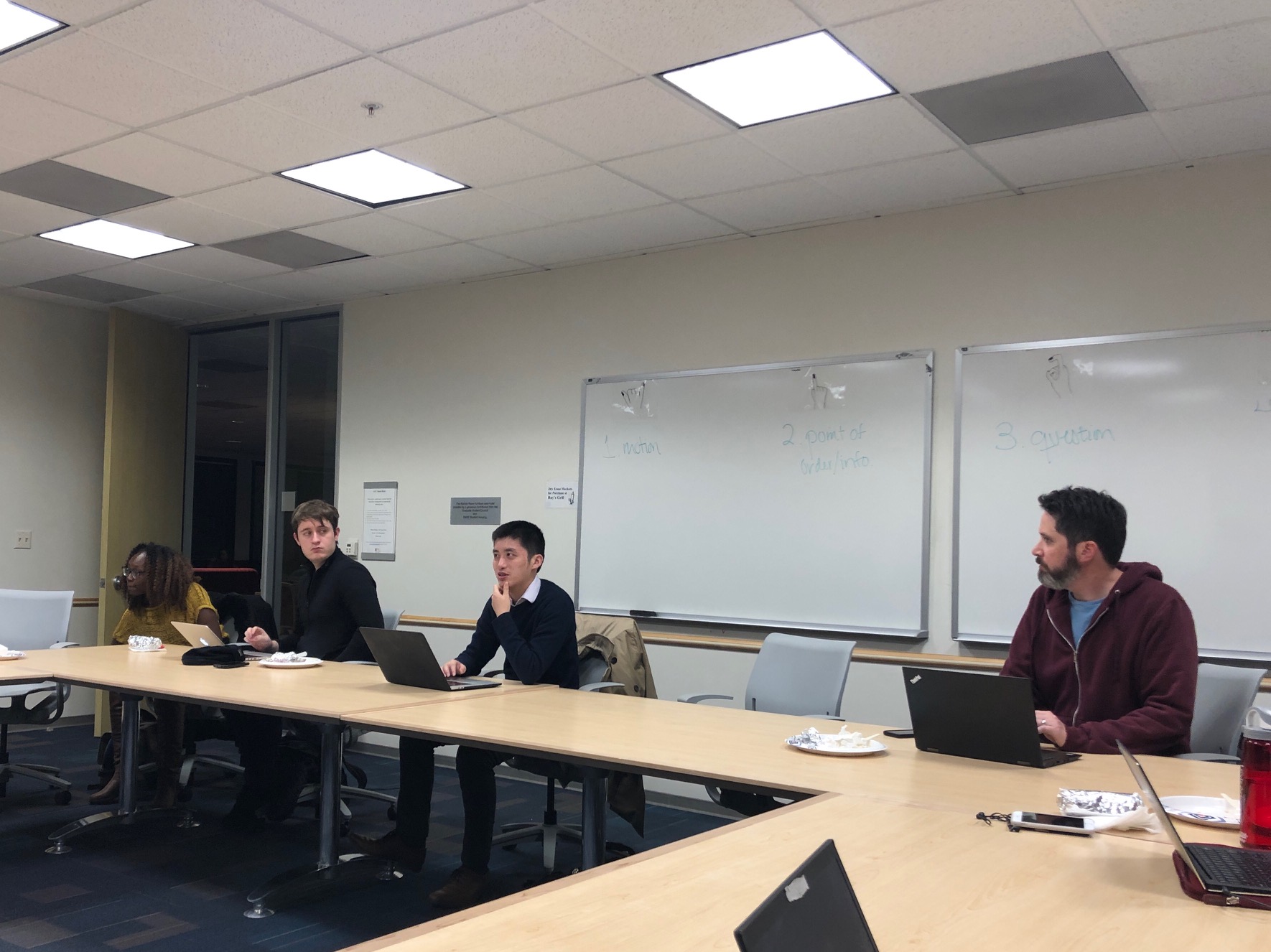The Graduate Student Council (GSC) on Wednesday night expressed concerns that graduate students would not be able to attend Residential and Dining Enterprises’ (R&DE) Lunar New Year celebration, which will be held in Wilbur Dining Hall on Thursday. Wilbur, a High Performance Education (HPE) dinner location, is typically closed to graduate students during dinner hours.
The GSC also saw a presentation on proposed constitutional reforms related to streamlining funding processes across graduate and undergraduate populations, reforming nominations to University committees and ensuring the Associated Students of Stanford University’s (ASSU) constitution complies with Federal and California law.
Lunar New Year Celebration
GSC Co-Chair Yiqing Ding, a third year M.S. student in Aeronautics and Astronautics, said that holding the R&DE’s Lunar New Year celebration at Wilbur Hall effectively bans graduate students from the event, despite the majority of East Asian international students being graduate students.
“There are 1,040 [Chinese] students in total, and 970 of them are graduate students,” Ding said. “So only 170 are undergrads.”
He did not provide figures for other East Asian student groups.
Graduate students cannot usually eat dinner at Wilbur as a result of R&DE’s decision to expand the HPE program, which serves high-calorie dinners designed for athletes but open to all undergraduate students. HPE dinners are not open to graduate students, so the program’s expansion originally reduced graduate students’ dinner options from nine dining halls to five. After pushback, Ricker was reopened to graduate students from 7–8:30 p.m.
In Tuesday’s meeting, Ding said the Lunar New Year complication is one of many arising out of R&DE’s decision, an issue the GSC has discussed with R&DE over the past few months.
GSC Co-Chair Amy Tarangelo, a fifth-year Ph.D. candidate in the Cancer Biology Program in the School of Medicine, described R&DE’s handling of the dining hall issue as “really irresponsible.”
“They haven’t given us a good resolution, and the solution to the problem took a long time to implement,” Tarangelo said. “Forbes Cafe is now open at night, which is great, but it took until now to open.”
Tarangelo added that it took the University a long time to open dinner dining options, despite the fact that the GSC raised this issue months ago with R&DE.
Councilmember Mateo Carrillo, a sixth-year Ph.D. candidate in Latin American History, said whoever planned the Lunar New Year celebration was probably not aware that Wilbur Dining is closed to graduate students.
“Otherwise it’s just discrimination,” he added.
Tarangelo echoed this sentiment, saying discrimination is the root of the problem.
The GSC noted that it is too late to change the dinner’s location, given that the dinner is one day after Wednesday’s GSC meeting. However, Tarangelo proposed that the Council send an email to set up a meeting with R&DE to express that the Council is “concerned and disappointed” with the decision to host the celebration at Wilbur Dining Hall.
The Daily has reached out to R&DE for comment.
Constitutional Reform
ASSU Assistant Financial Manager Luka Fatuesi ‘17, a former undergraduate senator, delivered the presentation on proposed constitutional reforms to the Council.
“We kind of determined early on in the project that it was unfeasible to solve every issue with the Constitution that we could think of within one year,” Fatuesi said. “So we narrowed ourselves to three categories … funding reform, nomination commission and legal compliance.”
The majority of reforms are being made to the funding process. Undergraduate and graduate students are currently on different funding systems. Specifically, undergraduates use the “annual grants” system, while graduate students use the “special fees” system. The largest part of the proposed reforms created regulatory harmony across both populations, using the undergraduate funding process as the basis for reform of the graduate funding system.
The reforms to the Nominations Commission clarified the process for the creation of “alternative arrangements,” which make committee nominations more efficient. Councilmember Kari Barclay, a Ph.D. candidate in Theater and Performance Studies, expressed concern over this reform.
“[Alternative arrangements cloud] transparency on how people get put on these committees,” Barclay said. “I do think that we should be focusing somewhat on procedure.”
Fatuesi responded by saying the alternative arrangements would require majority votes and are mainly implemented for the purpose of search committees. The University, due to the recruitment process, is unable to wait weeks for a nomination to University committees from student government, making speedy appointments necessary.
The last issue up for reform is the ASSU Constitution’s legal compliance.
“The University and the ASSU, institutionally speaking, view the Constitution as a contract between the students of Stanford as a corporate body with the University,” Fatuesi said.
This proposed reform is designed to make the contractual nature of the Constitution more clear and ensure that the contract complies with federal and California law.
The presentation ended with positive feedback and support from the council. Fatuesi will take feedback and proposed edits this week and come back to the GSC next week to talk about the reforms further.
This article has been updated to remove a sentence stating that it is unclear whether the Lunar New Year dinner is subject to the attendance restrictions of High Performance Education dinners. The Lunar New Year dinner is indeed subject to these restrictions.
Contact Emma Hard at emmahard ‘at’ stanford.edu.
